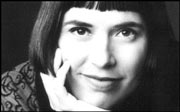THE VAGINA MONOLOGUES
Moore Theatre, 1932 Second, 292-ARTS, $26-$46 8 p.m. Tues.-Sat.; 7 p.m. Sun.; 2 p.m. matinees Sat. and Sun. runs Sept. 25-Oct. 7
“I’M NOT SURE the reason you write changes, but I think your ability to be out of your smaller personal self changes,” Eve Ensler, author of The Vagina Monologues, says of her progress as both an artist and a person. “I think when I was younger I perceived the world as victims and victimizers. You know, there were ‘goods’ and ‘bads.’ And I don’t see the world that way anymore at all, because I don’t feel like a victim anymore, and I see the world as much more complex than that.”
Ensler was reflecting on her work the day after last week’s tragic terrorist events, and she knows how the transformation of victimization into something either dangerous or compassionate is to be carefully watched in the world. Surviving a youth filled with sexual abuse and chemical dependency, she emerged on the other side to become an important playwright and activist. The Vagina Monologues, which opens here next week, captures that link between personal growth and universal happiness.
Ensler’s witty intellect and supple awareness serve her well—they were the things that led her to interview more than 200 women and girls about their most private part after hearing a feminist speak publicly of her own vagina in less than flattering terms.
“She was in the middle of menopause, and she was talking about dried, and finished, and done, and all of that,” Ensler remembers, chuckling. “And I was shocked, because, you know, she was a forward-thinking woman and I was thinking, ‘Oh my god, if she thinks that about her vagina, what do other people think?'”
ENSLER HAS a fine sense of humor, yet her play is so forthright in its treatment, it might be easy to dismiss as the wildest end of a touchy-feely theater spectrum (MAD TV even did a sidesplitting sketch imagining former first ladies performing the piece, including a befuddled Barbara Bush). But the show is surely the first to successfully and affectingly posit the female anatomy as one of the hallmarks of humanity. So did she initially think she’d done something important in letting it all hang out on such a grand scale?
“No,” she swears, laughing happily again. “You know what? I thought I’d written about vaginas. And that seemed like a good thing. No one else had done that. I feel I got something covered.”
And so she has: V-Day (V as in vagina), a national movement that sprang from the show and impacts world violence against women, has raised both consciousness and over $4 million dollars from both smaller and star-studded productions across the globe.
“I’ve been interviewing all these teenage girls, and it’s so fascinating because teenage girls are totally their bodies,” Ensler marvels. “They’re just amazing urges, pulses, desires, you know? I’ve just decided that what teenagers should do is dance. That’s kind of the verb that matches their internal experience. And I think what happens then is the world comes along and it says to women, ‘You can’t live at such a high intensity, you can’t be that sexual, you can’t be that powerful, you can’t have a voice.’ And we’re living off the gas fumes. We’re not living off the tank. And I think when you come back into your vagina, it means that you reinhabit your motor; you repossess it.”








